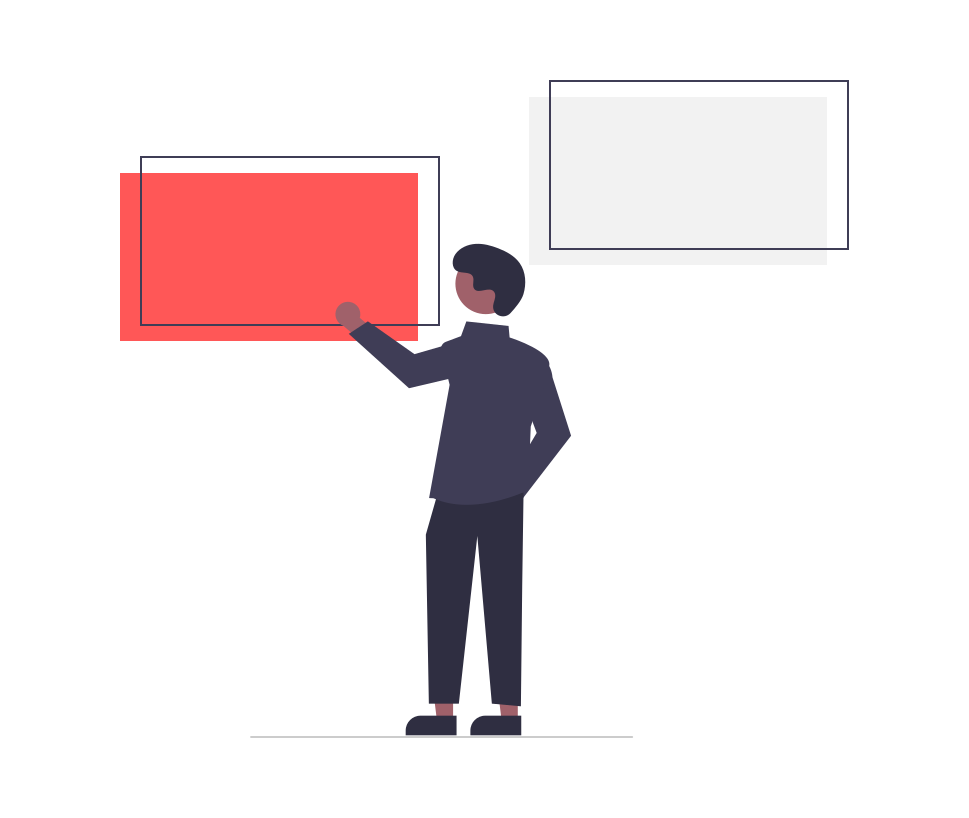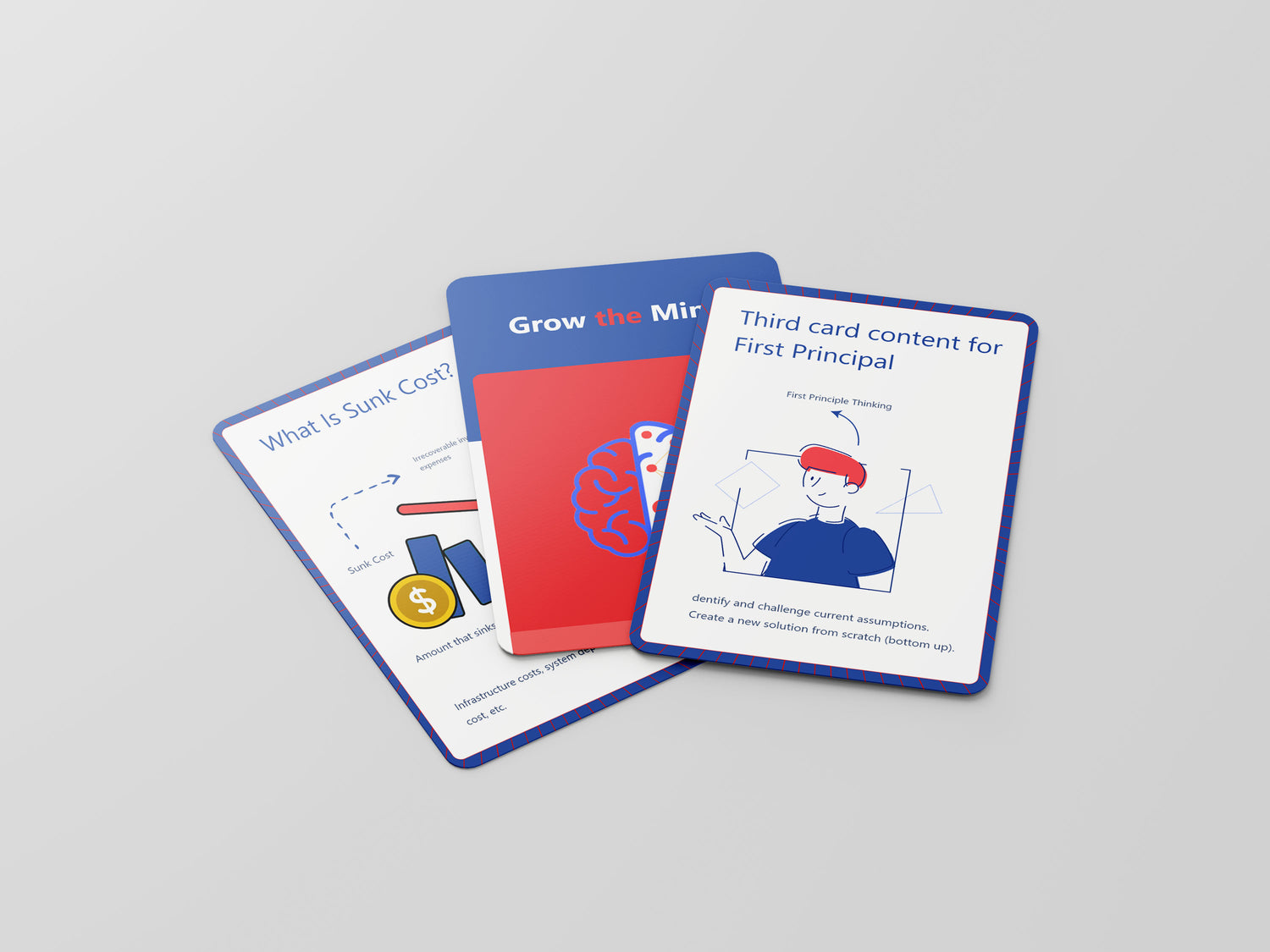Great Mental Models: The Key to Unlocking Success

Metacognition
Humans aren't the only species to think. In fact, every animal thinks. However, humans are the currently the only known species to perform metacognition, that is thinking about thinking. Mental models are tools for thinking and for growing one's mind & cognitive ability.

Grow the Mind
Maker hat - Corduroy
Share


Why Mental Models and Frameworks?
If you're like most people, you occasionally find yourself grappling with complex decisions or problems. The Frameworks and Mental Models flashcard deck is designed to help you by creating a mental toolbox of different patterns truths about the world. Once recognized, these frameworks and models offer perspective on interpreting the world around you to better understand it and better respond to it.
The original Frameworks and Mental Models Flashcard Set includes 42 cards for powerful mental models and frameworks to help reshape your perspective and understand the world in novel ways.
These models will help you avoid common biases that hinder people, and introduce new solutions, enabling you to view problems from different angles. Moreover, they're universally applicable - from business strategies to parenting challenges, and even managing personal life dilemmas.
Learning these mental models will enhance your creative thinking, pattern recognition, bias prevention, and general problem-solving.
Being familiar with them could spell the difference between success and failure.
Learning these mental models and frameworks is like getting a robust toolset for your brain. Each framework enabling you to uniquely, and quickly make sense of the world around you, to optimize decision making.
Great Thinkers and Their Mental Models

Elon Musk
The CEO of companies like SpaceX, Tesla, Neuralink, and others, Musk has often spoken about using first principles thinking, a foundational type of mental model that involves breaking a situation down to its most basic truths and then reasoning up from there.

Isaac Newton
Tell your brand's story through imagesThe foundational laws of physics that Newton developed can be seen as mental models for understanding the physical world.

Charlie Munger
The vice chairman of Berkshire Hathaway, Munger is perhaps the most well-known modern proponent of using mental models. He has frequently spoken about the importance of having a "latticework" of mental models from various disciplines that can be applied to investing and life decisions.

Warren Buffet
Often considered one of the greatest investors of all time, Buffett uses a variety of mental models to assess potential investments and make business decisions.

Daniel Kahneman
A Nobel Prize-winning psychologist, Kahneman co-authored many foundational studies on biases in decision-making with Amos Tversky. His book "Thinking, Fast and Slow" is a comprehensive overview of his research in this area and is a seminal work on the topic.
How Frameworks and Mental Models Help
The primary benefit of learning mental models and frameworks is enhanced problem-solving and decision-making abilities. These models provide different lenses through which to view, analyze, and understand the world, ultimately leading to more effective solutions and decisions.
Improved Understanding: Mental models help us understand complex systems and phenomena by breaking them down into manageable parts.
Better Decision Making: They enable us to make decisions based on tested and reliable principles rather than relying solely on intuition or gut feel.
Increased Efficiency: Mental models can often guide us to solutions more quickly by providing shortcuts to problem-solving.
Enhanced Creativity: By changing the way we view problems, mental models can also foster innovation and creativity.
Increased Adaptability: Having a diverse array of mental models at our disposal allows us to be more flexible and adapt to a wide range of situations.
Reduced Cognitive Biases: Being aware of models like the confirmation bias or the sunk cost fallacy can help us recognize and counteract these biases in our thinking.

Decision-making Mental Models
Mental Models are invaluable when it comes to decision making. There are a plethora of ways to evaluate a decision to increase the likelihood of a favorable outcome. Mental models give people an advantage - a toolset of concepts to apply to day-to-day decisions.
First Principles Thinking: Break problems into basic elements, then rebuild from the ground up.
Pareto Principle (80/20 Rule): Often, 80% of results come from 20% of efforts.
Opportunity Cost: Every choice has a trade-off; consider what's foregone with each decision.
Sunk Cost Fallacy: Don't base decisions on past investments; focus on future benefits.
Pros vs. Cons: List advantages and disadvantages to clarify choices.
Decision Fatigue: Making many decisions depletes cognitive energy, potentially leading to poorer choices.
Circle of Competence: Stick to decisions within your area of expertise.
Regression to the Mean: Extreme events usually follow with more average ones.

Cognitive Biases and Mental Models
Mental models don't just help us make better decisions by arming us with concepts, they also help us understand the "behind the scenes" of our, and other's minds, allowing one to correct flawed thinking.
Confirmation Bias: Favoring information that confirms pre-existing beliefs.
Anchoring: Over-relying on the first piece of information encountered.
Availability Heuristic: Basing decisions on immediate, easily recalled information.
Loss Aversion: Feeling the pain of loss more than the pleasure of similar gains.
Status Quo Bias: Preferring things to stay the same by doing nothing or maintaining current choices.
Dunning-Kruger Effect: Less competent individuals overestimating their ability, while experts may underestimate theirs.
Endowment Effect: Valuing something more simply because you own it.
Hindsight Bias: Believing, after an event, that you predicted or expected it.
Recency Bias: Giving more weight to recent events when evaluating something.
Online Learning
View all-

Mental Models for Iterative Learning Success
Iterative learning works through cycles of trial, feedback, and improvement. It thrives on small, continuous adjustments rather than one-time mastery. Mental models - cognitive tools to simplify complex problems -...
Mental Models for Iterative Learning Success
Iterative learning works through cycles of trial, feedback, and improvement. It thrives on small, continuous adjustments rather than one-time mastery. Mental models - cognitive tools to simplify complex problems -...
-

What Is Fundamental Attribution Error?
The Fundamental Attribution Error (FAE) is a common psychological bias where we overemphasize someone’s personality traits and overlook external factors when judging their actions. For example, if someone is late,...
What Is Fundamental Attribution Error?
The Fundamental Attribution Error (FAE) is a common psychological bias where we overemphasize someone’s personality traits and overlook external factors when judging their actions. For example, if someone is late,...
-

How Analogies Improve Problem-Solving
Analogies make tough problems easier by connecting what you know with what you're trying to solve. This method, called analogical reasoning, helps you identify patterns, simplify complex ideas, and generate...
How Analogies Improve Problem-Solving
Analogies make tough problems easier by connecting what you know with what you're trying to solve. This method, called analogical reasoning, helps you identify patterns, simplify complex ideas, and generate...

All your questions, answered
Frequently Asked Questions
What are mental models
Mental models are frameworks or concepts that help us understand and navigate the complexities of the world. They can be tools for thinking, decision-making, and problem-solving.
Why are mental models important?
Understanding and applying mental models can enhance critical thinking, improve decision-making, and foster more effective leadership.
How can mental models help in decision-making and leadership?
Mental models provide structured ways to approach problems, analyze situations, and predict outcomes, aiding in more informed decisions and leadership strategies.
Who are some great thinkers mentioned on your site?
Our site delves into the contributions of various thinkers who have influenced or developed prominent mental models and frameworks throughout history. This includes people such as Elon Musk, Charlie Munger, Carl Icahn, Warren Buffet, Isaac Newton, and manny more.
Can I contribute or suggest a mental model or framework?
We're always open to contributions and suggestions! Please contact our team to discuss potential collaborations or content inclusions.
What is the "deck" you offer, and how can it help me?
Our deck is a curated set of cards designed to teach and reinforce key mental models. By using the deck, users can familiarize themselves with these models and integrate them into their daily thought processes.
Can I get a discount for bulk purchases of the deck?
For bulk orders or institutional purchases, please contact our sales team for potential discounts and special offers.
Why do I need the Deck?
You may not! Everyone has different learning styles. It may be the case that reading long-form articles or watching youtube videos might help you learn better. For those of us who are more visual learners, I find a concise and content-packed deck with illustrations to be an effective learning method.
What is the quality of the deck cards? Are they durable?
Our deck is made with high-quality materials designed for regular use and longevity.
Can the deck be used in group settings, like workshops or classrooms?
Definitely! The deck is designed to be versatile and can be a valuable tool for educators, trainers, or team leaders to introduce and reinforce mental models in group settings.
How does the deck compare to the free content on the site?
While our site provides extensive information, the deck offers a tangible, structured, and curated way to learn and practice mental models, making it a complementary tool to our online content.



